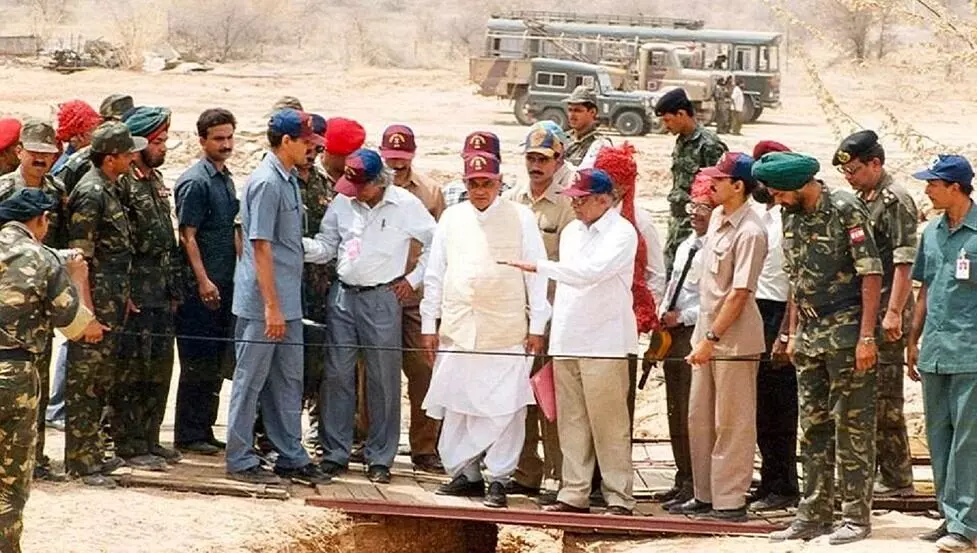Unsung hero: How Hyderabad’s Dr Sai Ram became part of India’s nuclear history
As India commemorates the 25th anniversary of the historic Pokhran nuclear tests, it is important to highlight the untold stories
By Nikisha Uddagiri
Hyderabad: As India commemorates the 25th anniversary of the historic Pokhran nuclear tests, it is important to highlight the untold stories of those who played a prominent role in this significant chapter of the nation’s history. Among the unsung heroes is Dr. Sai Ram, a dedicated physician who found himself unexpectedly brought into the heart of the Pokhran-II mission.
Born in 1964 in Himayath Nagar, Hyderabad, Dr. Sai Ram was a patriot who always wanted to serve the nation. He completed his medical education from Osmania Medical College and Kidwai Memorial Institute of Oncology (KMIO), Bangalore. Even before his results were announced, he was selected into the Border Security Force (BSF) in 1982.
Dr. Sai Ram was posted in Bangalore where he was responsible for starting a radiation centre. However, he was later transferred to Rajasthan without any prior intimation. Little did he know that he was about to become a part of history.
“For most of my tenure, I stayed in Bangalore, until one day I received the news of my transfer to Rajasthan. I was not so sure of the move, but in the armed forces, one doesn’t have an option of saying no,” says Sai Ram, confessing that he was not keen on leaving his comfort zone.
Arriving in Rajasthan, Sai Ram was asked to accompany his colleagues to a heavy weapon drill, a far cry from his usual duties as the chief medical in-charge of the South India Medical Board in Bangalore.
Recalling his arrival in the desert, Dr. Sai Ram says, “I went there with minimal escort and a small group of people. Travelling in special vehicles through the scorching heat of the desert, with temperatures ranging between 40-50 degrees, all I could see was endless stretches of sand. There was no vegetation, no signs of human habitation. It was a desolate environment where one could hardly discern whether they were in Pakistan or India.”
Assigned a tent equipped with all necessary provisions, Dr. Sai Ram had no idea of the historical event about to unfold. The 59-year-old doctor shares, “After the Pokhran test was over, I received instructions to return to headquarters. It was only when I read about it in the newspaper that I discovered I had been a part of the Pokhran nuclear test.”
The mission to conduct the Pokhran-II nuclear tests in 1998 was kept so secret that even some of the members of the mission were not aware of it. Sairam said, “I was a supporting staff, and details were not necessary to be shared with me.”
The tests were successful and gave India the capability to build nuclear weapons with high yields. The explosions were so powerful that the then-chairman of the Indian Atomic Energy Commission said that each one of them was equivalent to several tests conducted by other nuclear weapon states over decades.
The mission was completed without any medical emergencies, and according to Sai Ram, “As the nuclear test was conducted under the earth and humans were at the farthest, the test didn’t harm anyone. No radiation was released.”
After his tenure in the Border Security Force, Sai Ram took voluntary retirement and moved to Hyderabad. He worked in private hospitals before joining the MNJ Cancer Hospital. He also had the privilege of serving as a tour guide to the former President of India, APJ Abdul Kalam, during the inauguration of the Radiotherapy Centre of the Indian Red Cross Society (IRCS).
Speaking about the experience, Dr. Sairam fondly recalls, “The former president was very curious and used to ask many questions, so the team has selected me to be his tour guide. Yes, it was an amazing time with him.”
Dr. Sai Ram’s courage and dedication to duty were recognised and honoured by the Border Security Force. He was awarded a commendation roll by the director general of the BSF for his heroic actions during an evacuation operation in Karimnagar district. Despite the presence of Naxalites in the area, he fearlessly and efficiently provided critical medical assistance to an injured individual, exemplifying his unwavering commitment to serving others.
Reflecting on the award, Dr. Sairam says, “It was a great honour to receive the commendation roll from the Border Security Force. I believe it is not just an award for me, but for all the medical professionals who work selflessly to serve the country.”